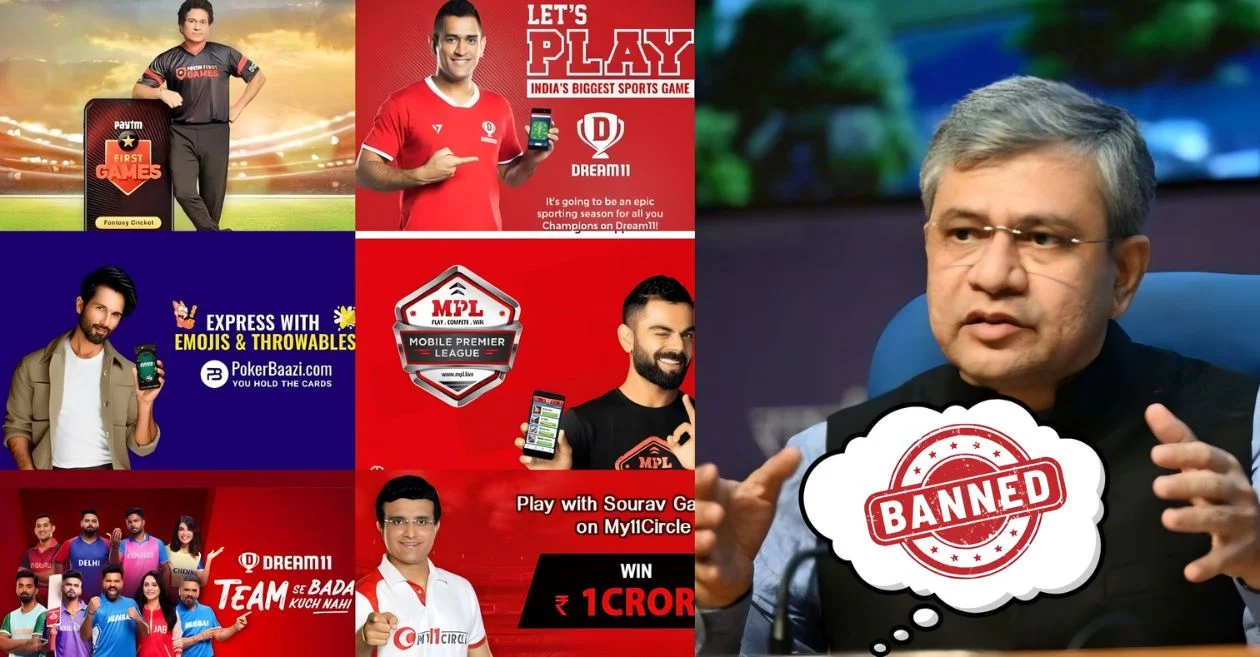In a sweeping legislative move, the Indian government has passed the Promotion and Regulation of Online Gaming Bill, 2025, a law that has sent shockwaves across one of the country’s fastest-growing digital industries. With this bill, the government has imposed a blanket ban on all online money games, including household names such as Dream11, My11Circle, MPL, and RummyCircle.
At the same time, the legislation makes a careful distinction: esports remain legal, provided that in-game purchases are cosmetic or entertainment-related and do not offer monetary returns. The move, according to the government, is designed to curb addiction, financial distress, fraud, and national security threats.
But as with any law that strikes at the intersection of business, technology, and individual freedom, the Online Gaming Ban has ignited a heated debate. On one hand, the government insists this is a welfare-first decision; on the other, industry voices and legal experts warn of constitutional overreach and economic disruption.
This article takes a deep dive into the legislation — its provisions, motivations, legal challenges, and broader implications.
What the Bill Says
The Promotion and Regulation of Online Gaming Bill, 2025 is unambiguous in its scope.
-
Any platform that facilitates monetary transactions between users and operators for online gaming is banned.
-
This applies across formats: fantasy sports, rummy, poker, teen patti, betting games, and even skill-based formats if they involve monetary deposits.
-
Esports carve-out: In contrast, video games where players can purchase skins, cosmetics, or upgrades for entertainment remain untouched, since these are classified as consumption, not gambling.
-
The bill includes penalties for violations, ranging from steep fines to imprisonment for operators that continue to run money-gaming platforms.
For an industry valued at over $2.5 billion in 2024 and projected to grow at 25–30% annually, the law is nothing short of an earthquake.
Why the Government Introduced the Ban
The government’s rationale can be broken into three broad arguments:
1. Curbing Social and Financial Harm
Union Minister Ashwini Vaishnaw, speaking on the floor of Parliament, emphasized that this move places public welfare above revenue considerations.
-
Over the past five years, there have been rising reports of youth addiction to online betting, with devastating consequences.
-
Families across states like Tamil Nadu, Maharashtra, and Karnataka have reported cases of financial ruin, debt traps, and even suicides linked to fantasy gaming apps.
-
Aggressive marketing campaigns — often backed by celebrity endorsements from cricket stars and Bollywood actors — have been accused of targeting vulnerable users with promises of “quick money.”
A senior government official told Hindustan Times:
“The lure of easy money has caused immense social damage. Addiction, broken families, and rising cases of youth depression are all linked to these platforms. The government has decided to prioritize welfare over tax revenue.”
By criminalizing deposits made with the expectation of monetary return, the bill aims to shield vulnerable citizens from harm.
2. Combating Financial Fraud and National Security Risks
The ban also stems from financial and security concerns.
-
Several investigative agencies have reported that betting apps were being used for money laundering and illegal cross-border financial flows.
-
Concerns of terror financing through these channels added a national security dimension.
-
Because many of these platforms operate inter-state and internationally, the lack of regulation created what policymakers called a “regulatory grey zone.”
The bill empowers authorities to block financial transactions linked to such platforms, close payment gateways, and impose criminal liability on operators facilitating these activities.
This crackdown is consistent with India’s larger push for financial transparency, seen in parallel with initiatives like the Digital India Act and the Prevention of Money Laundering Act amendments.
3. Redefining the Skill vs. Chance Debate
Perhaps the boldest aspect of the new law is its removal of the legal distinction between games of skill and games of chance.
-
For years, fantasy sports companies like Dream11 relied on favorable High Court and Supreme Court judgments that classified fantasy gaming as a game of skill, not gambling.
-
This provided them with a legal shield, allowing them to operate in most states.
-
But the 2025 bill closes that loophole by redefining all online money games as gambling, regardless of skill involvement.
In effect, whether you’re playing a fantasy cricket contest that requires hours of player analysis, or a poker hand that relies partly on chance, the law now sees both as gambling.
This eliminates ambiguity and ensures uniform regulation, but also raises serious constitutional questions.
Constitutional Challenges: The Legal Battle Looms
Legal experts almost unanimously agree: this law will be challenged in the courts. And the arguments are compelling.
Article 19(1)(g) – Right to Practice Any Profession
Indian courts have consistently upheld skill-based gaming as a legitimate business activity. By banning fantasy sports outright, the government is arguably imposing an unreasonable restriction on the right to trade.
Article 14 – Right to Equality
Critics argue the bill arbitrarily classifies skill games as gambling, despite contrary judicial precedent. This vague classification could fail the “reasonable classification” test under Article 14.
Article 301 – Freedom of Trade and Commerce
Since platforms like Dream11 and MPL operate across states, banning them may violate the constitutional guarantee of free trade across India.
Seventh Schedule – Federalism Concerns
Betting and gambling regulation falls under the State List (List II, Entry 34). By passing a central law, the Union government may be encroaching on state powers — a classic federalism conflict.
Legal experts cited in multiple media outlets suggest:
-
A writ petition in the Supreme Court is imminent.
-
A stay order on the ban has a 70–80% probability.
-
Partial or full quashing of the law remains 50–60% likely, depending on judicial interpretation.
This means that while the law is in effect, its long-term survival remains uncertain.
Industry Fallout: Billions at Stake
The impact on India’s online gaming industry is seismic.
-
According to FICCI-EY reports, the fantasy sports sector alone was expected to contribute ₹20,000 crore in taxes by 2030.
-
Startups like Dream11, MPL, My11Circle, and RummyCircle, which employ thousands directly and indirectly, face existential threats.
-
Sponsorship deals, particularly in cricket, will be heavily hit. The Indian Premier League (IPL), which featured Dream11 and MPL as major sponsors in past seasons, will lose a significant revenue stream.
For investors, this is a chilling signal. Global venture capital firms that poured billions into Indian gaming startups may now rethink their exposure to Indian digital markets.
Supporters of the Ban: Why Many Say It’s the Right Move
Despite the economic concerns, the government’s decision has garnered strong support in certain circles.
1. Protecting Citizens from Addiction
Families and social activists argue that the ban was long overdue. Addiction cases among teenagers and young adults had skyrocketed, leading to bankruptcies, crime, and suicides.
2. Blocking Black Money Channels
Financial watchdogs back the move, saying betting apps had become conduits for hawala operations and laundering schemes.
3. Clarity Over Confusion
By eliminating the “games of skill” loophole, the law avoids endless litigation and sets a clear, uniform standard: money games are gambling, full stop.
The Road Ahead: Regulation, Not Just Prohibition?
While the government has chosen an outright ban, some experts believe the future lies in regulation, not prohibition.
Countries like the UK and USA have allowed fantasy sports and betting platforms to operate under strict licensing frameworks, with rules for taxation, age restrictions, and consumer protection.
India, however, has chosen the more conservative route, citing its unique social fabric and the risks posed to its youth population.
Still, as court battles unfold, there remains the possibility that the judiciary could push for a middle path — striking down parts of the ban while upholding consumer safeguards.
A Turning Point in India’s Digital Economy
The Promotion and Regulation of Online Gaming Bill, 2025 is one of the most consequential digital-era laws India has passed. It has shut down a multi-billion-dollar industry, upended business models, and forced citizens to confront the dark underbelly of online betting.
For now, the government has taken a firm stance: welfare before revenue, clarity before chaos. Yet, the story is far from over. With legal challenges looming and the future of thousands of jobs and crores of investment on the line, the coming months will determine whether this ban marks the end of an era — or just a temporary pause before a redefined, regulated gaming industry emerges in India.
Either way, India has rolled the dice. The stakes couldn’t be higher.
Please check for information on the best betting sites in India – https://selectory.org/best-betting-sites/















